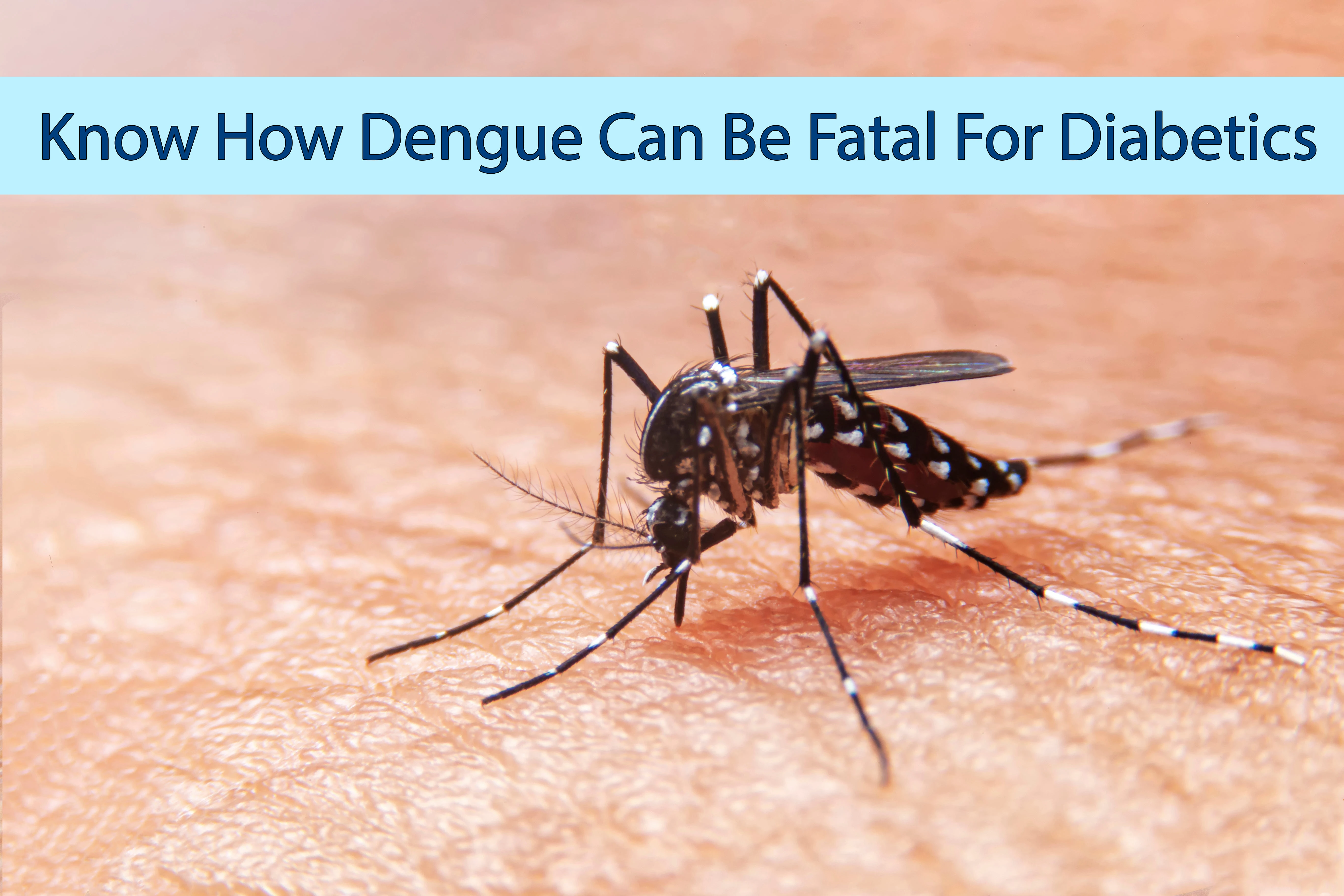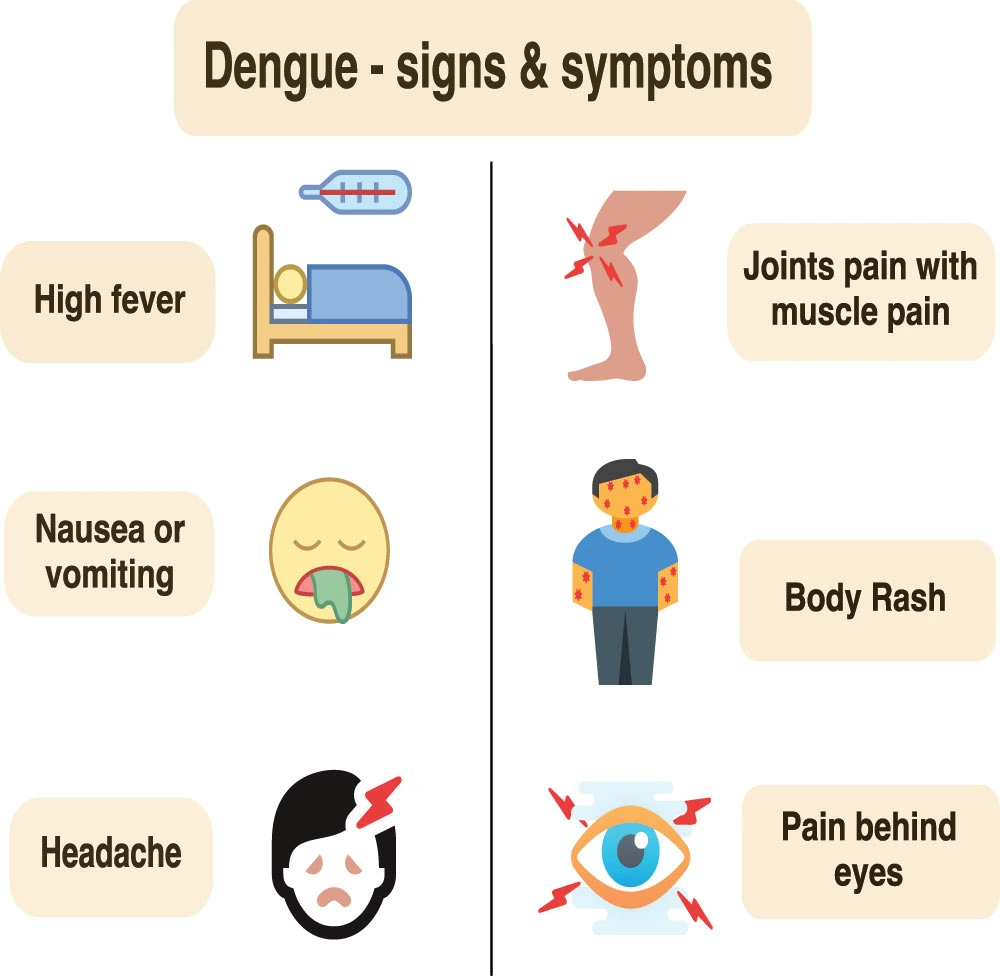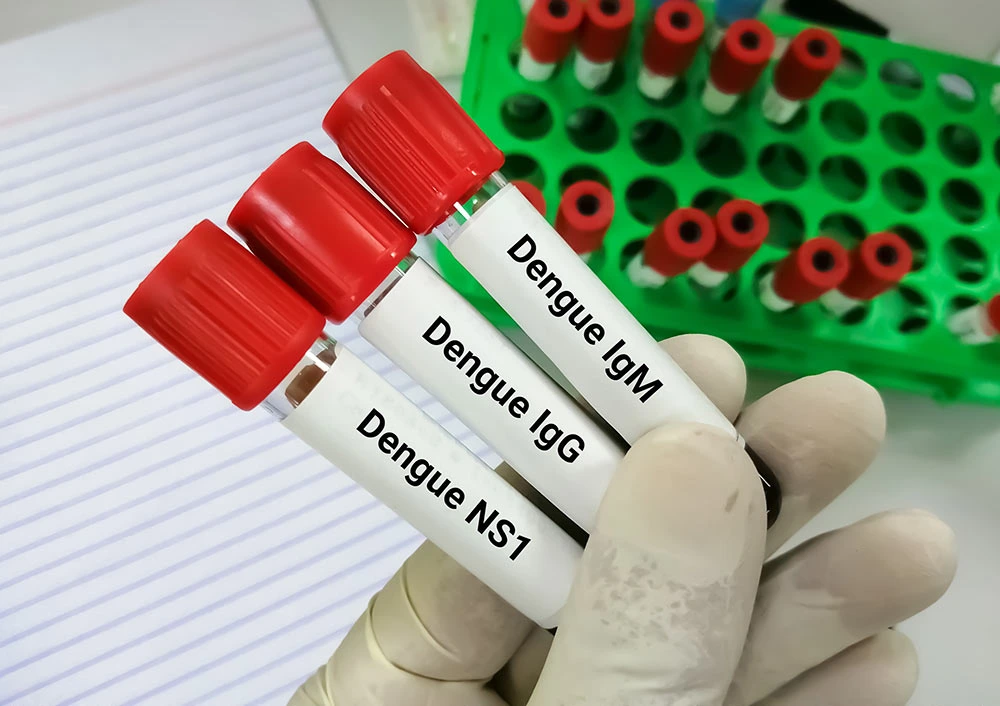Last updated on April 9th, 2022
Diabetes can worsen the complications arising on account of dengue. The winter season is on the go, so is the dengue menace. People with high blood glucose levels should be cautious about mosquitoes during this season, as dengue can be risky for them than non-diabetic people. Dengue as a complication of diabetes is a topic of huge concern as this might cause fatal conditions (like acute cardiac events).
Diabetes, being the most common chronic health disorder, has a huge impact on the lives of millions of people all around the world. Dengue brings about fever and magnifies the metabolic rate, resulting in raised blood sugar levels. If left unmonitored or unmanaged, the risk of severe complications also amplifies. In this article, you can learn about dengue, its symptoms, its diagnosis, and its association with diabetes or high glucose levels.
Dengue fever is a throbbing, debilitating mosquito-borne illness resulting due to any one of four closely connected dengue viruses. These viruses are associated with the viruses responsible for West Nile infection as well as yellow fever. A predictable 400 million dengue infections happen globally every year, with roughly 96 million giving rise to sickness. Many cases take place in tropical regions of the world, with the highest risk emerging in the Indian subcontinent.
Dengue fever spreads by the bite of a female Aedes mosquito contaminated with a dengue virus. Infection results in the mosquito when it bites an individual with the dengue virus in their blood. It can’t multiply directly from one individual to another individual.
Also Read: Can diabetics eat mango?

Signs of Dengue Fever
Signs, which generally start 4 to 6 days after infection and continue for up to 10 days, may involve:
- Nausea
- Vomiting
- Unexpected, high fever
- Severe joint and muscle pain
- Pain behind the eyes
- Vigorous headaches
- Exhaustion
- Mild bleeding (like a nose bleed, easy bruising, or bleeding gums)
- Skin rash, which may arise 2-5 days after the onset of fever
At times, signs are mild and can be mistaken for symptoms of flu or other viral infection. Younger kids and individuals who never caught hold of the infection before are expected to have milder cases as compared to older children or adults. On the other hand, serious issues may develop. These may involve dengue hemorrhagic fever, a rare complication in which there is a high fever, bleeding from the nose and gums, damage to lymph and blood vessels, an extension of the liver, as well as the collapse of the circulatory system. Signs can develop into intense bleeding, shock, and death. This is also termed dengue shock syndrome (DSS). Individuals having weak immunity and people with a second or successive dengue infection are thought to be at a higher risk for developing dengue hemorrhagic fever.
Also Read: Risk Associated Due to Anemia in Patients With Diabetes

Diagnosing Dengue Fever
Doctors can diagnose dengue infection with a blood test to check for the virus or antibodies to it. If you become sick after traveling to a tropical area, let your doctor know. This will allow your doctor to evaluate the possibility that your symptoms were caused by a dengue infection.
Treatment for Dengue Fever
There is no specific medicine to treat dengue infection. If you think you may have dengue fever, you should use pain relievers with acetaminophen and avoid medicines with aspirin, which could worsen bleeding. You should also rest, drink plenty of fluids, and see your doctor. If you start to feel worse in the first 24 hours after your fever goes down, you should get to a hospital immediately to be checked for complications.
Also Read: Jardiance Tablet – Know Its Uses, Benefits, Interaction, Precautions, and Side Effects
How to Prevent Dengue Fever?
The best way to prevent it is to keep away from bites by infected mosquitoes, chiefly if a person is residing in or traveling to a tropical region. This includes guarding oneself and making efforts to keep the mosquito load down. In 2019, a vaccine named Dengvaxia got FDA approval to assist in preventing the illness from taking place in adolescents age 9 to 16 years who already had been infected by dengue. However, no proper vaccine is available to prevent the general population from getting hold of it.
Against this background of amplifying dengue cases all over the world, the non-communicable illness load is also on the rise. Among this group, diabetes is one of the utmost important and predominant. The WHO states that diabetes has currently impacted 347 million people globally, and it is projected to be the 7th principal reason for mortalities by 2034. A lot of studies have identified diabetes as an independent risk factor for serious dengue.
Also Read: Normal Sugar Level Before And After Food
Risk Factors For Serious Illness
Severe illness more commonly occurs in toddlers and young children, and contrary to other infections it is found to be more common in kids that are moderately well nourished. Other risk factors for this serious illness can be high viral load, female sex, as well as high body mass index. While each serotype may result in a complete spectrum of illness, virus strain is another risk factor. An infection having one serotype is found to give enduring immunity to that particular type, but only acute defense against the other three. The menace of serious illness from secondary infection may magnify if any person previously exposed to serotype DENV-1 contracts serotype DENV-2 or DENV-3, or if any person previously exposed to DENV-3 catches hold of DENV-2. Dengue might be risky in individuals having lifetime illnesses like diabetes.
Polymorphisms in specific genes have been found to be associated with an increased risk of serious dengue complications. Instances can be genes coding for the proteins called TNF-α, mannan-binding lectin, DC-SIGN, PLCE1, CTLA-4, TGF-β, and specific types of human leukocyte antigen from gene variations of HLA-B. Polymorphisms occurring in the genes for the vitamin D receptor as well as FcγR appear to provide defense against serious illness in secondary dengue infection.
Dengue, one of the most common disorders as per the WHO, is next to malaria. Dengue is a central arthro-borne (ARBO) tropical infection. The number of dengue cases has amplified 30 times over the last eras. Currently, it is a major public health issue in both tropical as well as subtropical areas. Lack of enough public health awareness, scrutiny, and control, globalization, population growth, as well as urbanization, add on to this increase. A projected 2.5 billion individuals are at risk of infection in more than 100 endemic countries. It is also estimated by WHO that currently between 50 and 100 million dengue infections take place in a year. Roughly 5,00,000 dengue patients with potentially hazardous signs need hospitalization also every year and roughly 2.5% of those affected die. Dengue differs from asymptomatic or self-limiting non-serious dengue (having or not having warning signals) to severe dengue, categorized as serious plasma leakage, serious bleeding, or serious organ participation. Symptomatic dengue virus infections are classified into 3 clinical classes: undistinguishable fever, dengue fever (DF), as well as dengue hemorrhagic fever (DHF).
Further, DHF can be subclassified into 4 severity grades. Grades III and IV can be depicted as dengue shock syndrome (DSS). The clinical demonstration of dengue infection is quite complicated to foresee, even though the occurrence of warning symptoms within three to seven days after the initial signs demand strict vigilance as well as medical treatment. Intervention, such as i.v. rehydration as the preventative measure can be helpful in decreasing the case casualty in serious dengue to below 1%. Dengue has long been classified as a pediatric ailment; however, the average age of dengue patients is on the rise and there is a proposal for adults can be at enhanced risk for dying from dengue.
Also Read: Diabetic 2000 Calorie Diet Plan
Precautions and Recommendations for Escaping Dengue Transmission
- Always take a test for dengue if signs appear.
- Keep the surroundings clean and prevent water to get logged in nearby areas. Avoid accumulating water near surroundings or else mosquitoes will breed there.
- Make use of mosquito repellent to prevent getting bitten by the mosquitoes. The cream can be applied to the arms, legs, and neck. Utilize mosquito-repellent oils at all times of the day while at home.
- A healthy lifestyle is a must.
- Use mosquito nets while sleeping at night.
- Wear outfits having long sleeves covering the entire body.
- Follow the recommended diet and exercise routine.
- Pregnant females must be extra careful of dengue: Mosquitoes get attracted to carbon dioxide very fast. For this reason, a pregnant female must be careful as the possibilities of getting bitten by a mosquito are high as the person tends to release more carbon dioxide. Also, a person’s body temperature to being a bit raised makes him or her more bite-friendly.
- As for a person’s diabetes, it is a must to keep track of blood glucose levels regularly. Avoid forgetting the insulin shots and medication.
- It’s also required to wear clothes of a lighter hue so as to be less appealing for such flying dangers.
These steps would not only protect a person against dengue but also assist in guarding the community at large. On top of the aforementioned measures, it is important to boost immunity to help a person build an improved resistance against illnesses. Timely medical treatment and monitoring can be helpful in saving many lives. It is advised for all patients with a history of diabetes or heart problems to call for a doctor if they have a high fever for more than 24 hours. Based on the patient’s condition, the dosage of the medicines may require a modification. Dengue falls under the deadliest and widely spread mosquito-borne ailments universally. It becomes more deadly and amplifies the threat of complications that patients may experience such as shock syndrome.
Summary
Both diabetes and dengue have reached sweeping dimensions. Both have been seen to pose a joint menace to a large share of populations residing in low- as well as middle-income countries. Dengue is no more a disorder principally having an effect on children. Thus, the impact of non-communicable illnesses like diabetes, which are progressively predominant in adults, on the clinical appearance of a dengue incidence is said to be a public health urgency. Diabetes must be measured in the triage of patients for close vigilance and early intervention, which remain one of the biggest challenges, chiefly during the outbreak of dengue. Appropriateness of intervention remains the most essential factor in escaping severe complications and mortality in patients catching hold of acute dengue.
FAQs:
How can I manage my high blood sugar?
Some key points for managing the high levels of blood glucose can be:
- Go physically active. Regular exercise is thought to be an effective way to control your raised blood glucose levels.
- Take your prescribed drugs as per the doctor’s guidelines.
- Monitor your levels regularly and keep track on a diary.
- Follow your diabetes meal plan as directed by your dietician or nutritionist.
- Adjust your insulin dosages only as per the doctor’s recommendations in order to control hyperglycemia.
Is there an increase in the glucose level during fever?
When a person is ill, his or her body releases hormones that may trigger the levels of blood sugar. And this is already a subject of concern when a person suffers from type 2 diabetes.
Why sugar elevates in infection?
Infection brings about a stress response in the body by amplifying the number of various hormones like adrenaline and cortisol. These hormones act against the activity of insulin and, because of this, the production of sugar by the body increases, which gives rise to high blood glucose levels.
Can dengue result in high sugar levels?
Dengue results in fever and amplifies the metabolic rate, which may bring about a rise in variation in blood glucose levels. If it is left unmonitored, the risk of such patients developing severe complications increases.
Is glucose good for dengue?
According to various studies, glucose intolerance is often linked to dengue fever in its early course. These observations might assist in the early diagnosis of dengue fever, and may permit for escaping of dextrose infusions as a fluid replacement in dengue fever.
References:
- https://www.ncbi.nlm.nih.gov/pmc/articles/PMC5820327/
- https://researchonline.lshtm.ac.uk/id/eprint/292313/1/pntd.0001641.pdf
- https://www.cureus.com/articles/13041-management-of-diabetic-ketoacidosis-with-dengue-hemorrhagic-fever
- https://www.ncbi.nlm.nih.gov/pmc/articles/PMC4409149/
Last Updated on by Dr. Damanjit Duggal
Disclaimer
This site provides educational content; however, it is not a substitute for professional medical guidance. Readers should consult their healthcare professional for personalised guidance. We work hard to provide accurate and helpful information. Your well-being is important to us, and we value your feedback. To learn more, visit our editorial policy page for details on our content guidelines and the content creation process.

 English
English














